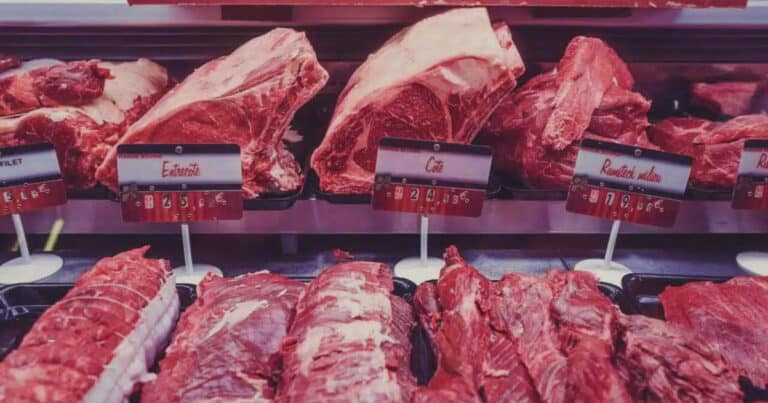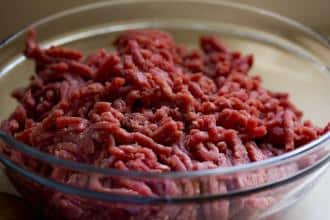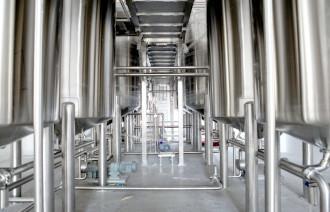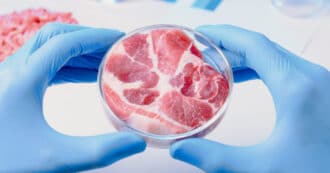By Noga Wies – If you’ve ever considered becoming a vegetarian or at least cutting down on meat consumption, the chances are that you were motivated by a desire to reduce animal suffering and will be interested in learning more about synthetic meat. In 2018, 302 million cattle, 1.5 billion pigs, and a staggering 69 billion chickens were slaughtered for meat production.
This may sound horrific, but surprisingly, this is hardly the only problem with the meat industry. In fact, although the environmental impacts of the meat industry aren’t as well known, they are certainly far more hazardous than the suffering of the billions of animals that make their way to our plates each year.
The Benefits of Synthetic Meat
It sure sounds like something out of this universe creating meat in laboratories. But when you understand how many benefits there are to this production method, you will begin to see that this is a key way forward to feeding the growing global population.
Synthetic Meat Saves Land
Let’s start with the land on which all these animals are raised before being slaughtered. Due to land-covering glaciers and vast expanses of barren land, only 71% of the land on our planet is habitable to begin with, and a whopping 38.5% of all habitable land is allocated to livestock farming.
This leaves very little land for cities, towns and villages, and as these grow to support ever-growing populations, wild habitats are increasingly annexed or converted into agricultural land to satisfy the skyrocketing demand for food. This is especially tragic when the wild habitats that are being destroyed to clear land for livestock farming are rainforests or similar priceless treasures of biodiversity.
Synthetic Meat Saves Feeding the Animals
Now that we’ve cleared land for our livestock, how much will they need to eat before they’re fit for slaughtering? As it turns out, the process by which animals convert the plants that they eat into the meat we eat is extremely inefficient; 3.3 kilograms of feed are required to produce each kilogram of poultry, and almost twice that – 6.4 kilograms of feed – is required to produce just one kilogram of pork. If you’re a steak enthusiast, the inefficiency is even harder to swallow – the production of a kilogram of beef requires a mind-boggling 25 kilograms of feed! 25 kilograms of feed!
Needless to say, countless more acres of land must be dedicated to growing all this feed and an astonishing amount of freshwater is used for its irrigation.
Synthetic Meat Reduces Emissions from Food Production
Surely now that we’ve paid an exorbitant environmental price just to provide our livestock with food and land to live on, we can sit back and enjoy our meat. But unfortunately, that’s hardly the last of the environmental sacrifices we make for a burger!
26% of all greenhouse gas emissions are due to food production, with livestock being responsible for a large percentage of those emissions. There are emissions associated with fertilizer production and application, emissions from seed and feed production and transport, and emissions resulting from agricultural infrastructure construction and maintenance.
Consequently, 9.87 kilograms of greenhouse gases are emitted per kilogram of poultry and 12.31 kilograms of greenhouse gases are emitted per kilogram of pork. Cattle host special methane-producing bacteria in their digestive systems, and this methane greatly contributes to the astounding 99.48 kilograms of greenhouse gases emitted per kilogram of beef. Moreover, since methane is 20 times more efficient than carbon dioxide at trapping radiation, cattle farming is the most significant agricultural cause of greenhouse gas emissions and thus of global warming.
Synthetic Meat Can Meet the Demand of the Growing Human Population
As the Earth’s population grows, so does the demand for real meat. Growing meat has more than tripled over the last 50 years, leading to the growing severity of the problems described above. Given that a mass conversion to vegetarianism is extremely unlikely, what can we do? The answer is simple – we can grow meat in a lab.
Synthetic Meat is more Efficient than Slaughtering Animals
The meat we eat is mostly muscle tissue. Why, then, must we raise a whole animal and invest copious resources in it before slaughtering the poor creature, only to consume a few of its muscles? To solve this problem, scientists turned to stem cells. Most of the cells in your body are specialized cells, such as bone cells, blood cells, skin cells, and muscle cells. But this wasn’t always the case.
Directing Cells to Grow Synthetic Meat
Back in your earliest embryological days, before you had anything resembling a body, all of your types of cells had the capacity to “choose” a path and differentiate into specific kinds of cells. Cells capable of differentiating into the myriad cell types in your body are known as stem cells, and although few of them remain in the adult body, they are the key to producing lab-grown, or cultured, meat.
Here’s how it works: scientists can, for example, collect stem cells from a cow under local anesthesia (without harming the cow). The stem cells are then taken to a lab, where they are immersed in a special medium, or nutrient-rich liquid, that induces both differentiation into muscle tissue and rapid cell division. This is how a few stem cells can quickly give rise to a large piece of cow muscle tissue in a petri dish. The cultured beef of a cow muscle, which is nearly identical to a natural cow muscle, can then be grilled and consumed.
Labs Culturing Meat
There are dozens of academic labs and meat companies around the world working on cultured meat. The lucky few who have tasted the fruit of their labor have found its taste to be almost indistinguishable from natural meat.
Although cultured meat is currently too expensive to be a viable alternative to natural meat, researchers are toiling away to reduce the cost of the expensive media used in the culturing process, and cultured meat is expected to be sold in grocery stores in the not too distant future.
Synthetic Meat Provides Enhanced Nutrition
Once that goal is achieved, scientists will be able to turn their attention to genetically engineering cultured meat to enhance its nutritional value. By introducing genes involved in the synthesis of various nutrients into the DNA of the stem cells used to produce cultured meat, scientists will create “super-meat”, that could prove especially useful in combatting malnutrition in developing countries.
In other words, cultured meat is expected to become a nutrient-rich, cruelty-free animal food source with a drastically decreased environmental impact.
Meat in Space ….. like Star Trek
Amazingly, synthetic meat may be the solution to problems both on Earth and in outer space! Storing sufficient meat for astronauts on prolonged missions, such as those traveling to Mars, would require huge storage facilities aboard relatively small spacecraft. To solve this problem, NASA is conducting research on meat culturing in hopes that astronauts will one day grow their own meat while exploring space.
Meat and Religious Ethics
Deuteronomy chapter 12, verse 15 uses the word ‘desire’ in relation to eating meat. Contemporary Rabbi David Rosen explains how “the Hebrew word ta’avah (desire) of this verse may be translated into English as ‘lust,’ which is not a positive word. Despite this, the Torah (Pentateuch) allows for the consumption of animal products and surely there were times and places in the course of history where human beings could not get all their necessary nutrients without a certain amount of animal protein. But then again the conditions under which that animal protein was obtained were totally different from that which the vast majority of meat is provided on the market today.”
Rabbi Rosen continues, “Nevertheless, it is clear that, for the Torah, the ideal is not a meat consumptive lifestyle. This is to be seen already in the Garden of Eden where the ideal society is a vegan society and even to many of our commentators, early commentators, in the vision of the messianic age as articulated by the prophet Isaiah where the wolf and the lion are living with the lamb and the goat. So you have this vision of an ideal society.”
The above teachings are based on those of many earlier rabbis, including Rabbi Don Isaac Abarbanel states that “eating plant-based foods is right and proper,” since such foods are less likely to spoil, and promote in us the correct balance between materialism and spirituality. He mentions the opinion of Rabbi Joseph Albo, who states that originally Adam and Eve were given only fruit and vegetables since killing animals to eat meat breeds cruelty in humankind.
Is Synthetic Meat Playing God?
One might wonder about the ethics of lab grown meat, since it involves humans growing something in labs that exists naturally as animals. Many religious clergy, including Rabbi Rosen, support synthetic meat, since it replaces conventional meat production, which as mentioned below is highly problematic in regards to animal cruelty, climate change, and water pollution.
Interfaith Animal Efforts, and Synthetic Meat
Many interfaith efforts exist in regards to animal welfare, and these dovetail with efforts to promote synthetic meat. For example, the Animal Interfaith Alliance works “to promote a vegetarian/vegan diet, which also embraces the issues of environmental protection, healthy lifestyles and ending world hunger, and to end animal exploitation.”
Israel Leads the Way in Synthetic Meat Production
Aleph Farms is one of Israel’s cutting edge Start Ups that is becoming the world’s first industry leader in the field of synthetic meat.” Aleph Farms is the brainchild of the beloved heritage food company, Strauss Group, top research university, Technion – Israel Institute of Technology, and veteran CEO, food engineer and biologist, Didier Toubia. Founded in 2017 by this group of food experts, parents, nature lovers, and scientists, we’re humbly united in our mission to feed the world and preserve the planet.”
As we know, current methods of meat production aren’t sustainable. As the world’s population increasingly expands, people will have no choice but to eventually add meat alternatives, that have been developed in unique ways, into their diet, unless they want to give it up all together.
Despite sounding like science fiction, synthetic meat may become a staple of our diets in the near future!
* Featured image source
Interested in learning more? Check out our post on The Principles of Sustainable Development.





